Uses
This medication is used with other medications to help control seizures. It belongs to a class of medications called benzodiazepines, which act on the brain and nerves (central nervous system) to produce a calming effect. This drug works by enhancing the effects of a certain natural chemical in the body (GABA).
How to use Sympazan
See also Warning section.
Read the Medication Guide and Instructions for Use provided by your pharmacist before you start taking clobazam and each time you get a refill. If you have any questions, ask your doctor or pharmacist.
Take this medication by mouth with or without food as directed by your doctor, usually once or twice daily. If you are taking this medication once daily, then take it at bedtime. If you are taking this medication in divided doses, take the larger dose at bedtime.
The dosage is based on your age, weight, medical condition, and response to treatment.
Apply the medication on top of the tongue and let it dissolve. Do not chew, spit, talk, or drink any liquids while the medication is dissolving. Swallow saliva normally as the medication is dissolving. If your dose is for more than one film, let the first film fully dissolve before using the next film.
Use this medication regularly to get the most benefit from it. To help you remember, take it at the same time(s) each day.
Though it helps many people, this medication may sometimes cause addiction. This risk may be higher if you have a substance use disorder (such as overuse of or addiction to drugs/alcohol). Take this medication exactly as prescribed to lower the risk of addiction. Ask your doctor or pharmacist for more details.
When this medication is used for a long time, it may not work as well. Talk with your doctor if this medication stops working well.
Tell your doctor if your condition lasts or gets worse.
Side Effects
See also Warning section.
Drowsiness, dizziness, tiredness, constipation, cough, drooling, or trouble sleeping may occur. If any of these effects last or get worse, tell your doctor or pharmacist promptly.
Remember that this medication has been prescribed because your doctor has judged that the benefit to you is greater than the risk of side effects. Many people using this medication do not have serious side effects.
Tell your doctor right away if you have any serious side effects, including: mental/mood changes (such as agitation, nervousness, confusion), muscle weakness, loss of coordination, trouble speaking, painful urination.
A small number of people who take anticonvulsants for any condition (such as seizure, bipolar disorder, pain) may experience depression, suicidal thoughts/attempts, or other mental/mood problems. Tell your doctor right away if you or your family/caregiver notice any unusual/sudden changes in your mood, thoughts, or behavior including signs of depression, suicidal thoughts/attempts, thoughts about harming yourself.
Get medical help right away if you have any very serious side effects, including: slow/shallow breathing.
Clobazam may rarely cause very serious (possibly fatal) skin reactions, especially during the first 8 weeks of treatment or when restarting treatment with this medication. Get medical help right away if you develop any of the following symptoms: skin rash/blisters/peeling, itching, or mouth sores. If you have a very serious skin reaction and your doctor says it was caused by clobazam, you should not take the medication again. Ask your doctor or pharmacist for more details.
A very serious allergic reaction to this drug is rare. However, get medical help right away if you notice any symptoms of a serious allergic reaction, including: fever, swollen lymph nodes, rash, itching/swelling (especially of the face/tongue/throat), severe dizziness, trouble breathing.
This is not a complete list of possible side effects. If you notice other effects not listed above, contact your doctor or pharmacist.
In the US -
Call your doctor for medical advice about side effects. You may report side effects to FDA at 1-800-FDA-1088 or at www.fda.gov/medwatch.
In Canada - Call your doctor for medical advice about side effects. You may report side effects to Health Canada at 1-866-234-2345.
Warnings
Clobazam has a risk for abuse and addiction, which can lead to overdose and death. Taking this medication with alcohol or other drugs that can cause drowsiness or breathing problems (especially opioid medications such as codeine, hydrocodone) may cause very serious side effects, including death. To lower your risk, your doctor should have you take the smallest dose of clobazam that works, and take it for the shortest possible time. Be sure you know how to take clobazam and what other drugs you should avoid taking with it. See also Drug Interactions section. Get medical help right away if any of these very serious side effects occur: slow/shallow breathing, unusual lightheadedness, severe drowsiness/dizziness, difficulty waking up.
Suddenly stopping this medication may cause serious (possibly fatal) withdrawal, especially if you have used it for a long time or in high doses. To prevent withdrawal, your doctor may lower your dose slowly. Tell your doctor or pharmacist right away if you have any withdrawal symptoms such as headaches, trouble sleeping, restlessness, hallucinations/confusion, depression, nausea, or seizures. Withdrawal symptoms may sometimes last weeks to months.
Precautions
Before taking clobazam, tell your doctor or pharmacist if you are allergic to it; or to other benzodiazepines (such as diazepam, lorazepam); or if you have any other allergies. This product may contain inactive ingredients, which can cause allergic reactions or other problems. Talk to your pharmacist for more details.
Before using this medication, tell your doctor or pharmacist your medical history, especially of: muscle disorders (such as myasthenia gravis, weakness, loss of coordination), glaucoma, liver disease, personal or family history of a substance use disorder (such as overuse of or addiction to drugs/alcohol), mental/mood disorders (such as depression, psychosis), breathing problems (such as asthma, chronic obstructive pulmonary disease-COPD, sleep apnea).
Before having surgery, tell your doctor or dentist about all the products you use (including prescription drugs, nonprescription drugs, and herbal products).
This drug may make you dizzy or drowsy. Alcohol or marijuana (cannabis) can make you more dizzy or drowsy. Do not drive, use machinery, or do anything that needs alertness until you can do it safely. Avoid alcoholic beverages. Talk to your doctor if you are using marijuana (cannabis). Alcohol may also increase the drug levels.
Older adults may be more sensitive to the effects of the drug, especially drowsiness. This drug may also cause excitement instead of drowsiness in older adults.
Children may be more sensitive to the effects of the drug. This drug can often cause excitement in young children instead of drowsiness.
During pregnancy, this medication should be used only when clearly needed. It may harm an unborn baby. Newborn babies of mothers who use this medication late in pregnancy may have symptoms such as slow/shallow breathing, nonstop crying, shaking, or trouble feeding. However, since untreated seizures are a serious condition that can harm both a pregnant woman and her unborn baby, do not stop taking this medication unless directed by your doctor. If you are planning pregnancy, become pregnant, or think you may be pregnant, talk to your doctor right away about the risks and benefits of this medication. Since birth control pills, patches, implants, and injections may not work if taken with this medication (see also Drug Interactions section), discuss reliable forms of birth control with your doctor.
This drug passes into breast milk and may have undesirable effects on a nursing infant. Consult your doctor before breastfeeding.
Interactions
See also Warning section.
Drug interactions may change how your medications work or increase your risk for serious side effects. This document does not contain all possible drug interactions. Keep a list of all the products you use (including prescription/nonprescription drugs and herbal products) and share it with your doctor and pharmacist. Do not start, stop, or change the dosage of any medicines without your doctor's approval.
Some products that may interact with this drug are: orlistat, sodium oxybate.
Other medications can affect the removal of clobazam from your body, which may affect how clobazam works. Examples include fluconazole, fluvoxamine, among others.
The risk of serious side effects (such as slow/shallow breathing, severe drowsiness/dizziness) may be increased if this medication is taken with other products that may also cause drowsiness or breathing problems. Tell your doctor or pharmacist if you are taking other products such as opioid pain or cough relievers (such as codeine, hydrocodone), alcohol, marijuana (cannabis), drugs for sleep or anxiety (such as alprazolam, lorazepam, zolpidem), muscle relaxants (such as carisoprodol, cyclobenzaprine), or antihistamines (such as cetirizine, diphenhydramine).
Check the labels on all your medicines (such as allergy or cough-and-cold products) because they may contain ingredients that cause drowsiness. Ask your pharmacist about using those products safely.
This medication may decrease the effectiveness of hormonal birth control such as pills, patch, or ring. This could cause pregnancy. Discuss with your doctor or pharmacist if you should use reliable backup birth control methods while using this medication. Also tell your doctor if you have any new spotting or breakthrough bleeding, because these may be signs that your birth control is not working well.
Overdose
If someone has overdosed and has serious symptoms such as passing out or trouble breathing, call 911. Otherwise, call a poison control center right away. US residents can call 1-800-222-1222. Canada residents can call 1-844-764-7669. Symptoms of overdose may include: confusion, weakness, severe drowsiness/dizziness, slow/shallow breathing, loss of consciousness, slowed/decreased reflexes.
Do not share this medication with others. Sharing it is against the law.
If you miss a dose, take it as soon as you remember. If it is near the time of the next dose, skip the missed dose. Take your next dose at the regular time. Do not double the dose to catch up.
Store at room temperature away from light and moisture. Do not store in the bathroom. Keep all medications away from children and pets.
Do not flush medications down the toilet or pour them into a drain unless instructed to do so. Properly discard this product when it is expired or no longer needed. Consult your pharmacist or local waste disposal company.
Images

Sympazan 10 mg oral film
Color: whiteShape: rectangularImprint: C10This medicine is a white, rectangular, film imprinted with "C10".
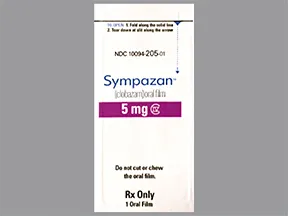
Sympazan 5 mg oral film
Color: whiteShape: rectangularImprint: C5This medicine is a white, rectangular, film imprinted with "C10".
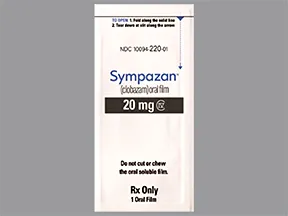
Sympazan 20 mg oral film
Color: whiteShape: rectangularImprint: C20This medicine is a white, rectangular, film imprinted with "C10".
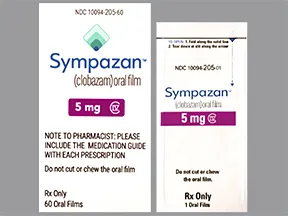
Sympazan 5 mg oral film
Color: whiteShape: rectangularImprint: C5This medicine is a white, rectangular, film imprinted with "C10".
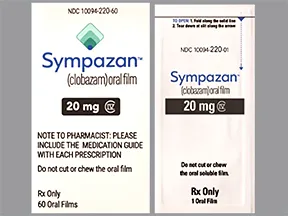
Sympazan 20 mg oral film
Color: whiteShape: rectangularImprint: C20This medicine is a white, rectangular, film imprinted with "C10".
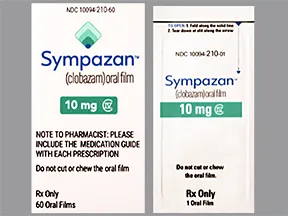
Sympazan 10 mg oral film
Color: whiteShape: rectangularImprint: C10This medicine is a white, rectangular, film imprinted with "C10".
Are you currently using Sympazan?
This survey is being conducted by the WebMD marketing sciences department.
Selected from data included with permission and copyrighted by First Databank, Inc. This copyrighted material has been downloaded from a licensed data provider and is not for distribution, except as may be authorized by the applicable terms of use.
CONDITIONS OF USE: The information in this database is intended to supplement, not substitute for, the expertise and judgment of healthcare professionals. The information is not intended to cover all possible uses, directions, precautions, drug interactions or adverse effects, nor should it be construed to indicate that use of a particular drug is safe, appropriate or effective for you or anyone else. A healthcare professional should be consulted before taking any drug, changing any diet or commencing or discontinuing any course of treatment.